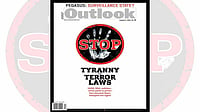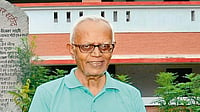Jagdeep Dhankhar has had a tumultuous few months as West Bengal’s new governor. Ever since he went to the Jadavpur University to rescue a union minister trapped in a students’ agitation, his relationship with the state government has steadily deteriorated. As the constitutional head of the state, he once went to visit the state assembly, but found the gate locked. And when he visited the Calcutta University, the vice-chancellor was missing.
Dhankar continues to be in the news for the wrong reasons. He says state Chief Minister Mamata Banerjee described him on the floor of the assembly as ‘Tu Cheez Badi Hain Mast Mast’, while senior ministers routinely call him a tourist. Dhankhar spoke to editor-in-chief Ruben Banerjee and correspondent Rajat Roy on the challenges he faces and what the future holds.
Excerpts:
Q: It has been a few tumultuous months since you became the governor. Do you feel at home in West Bengal?
G: I feel more than at home. The love of the people has touched me. The cultural depth here is remarkable. I have been to nine districts so far —everywhere I was touched by the love of the people.
Q: But then you have been mostly in the news for all the wrong reasons.
G: Ask those who have scripted it. Get a response from those responsible for a situation that the governor goes to the Assembly after informing the speaker to find the gate locked. I visit a university as a chancellor only to find the vice-chancellor’s office locked. All these are not a healthy script.
Q: So, who do you think is writing the script?
G: I believe in one script, the script of Indian Constitution. But obviously not everyone here is following the script. There has to be accountability.
Q: Where did this all start?
G: Surely it couldn’t have started with me. I am a copybook low-profile governor. The narrative, set afloat in the media that the governor is at loggerheads with the government, pains me. It is actually the other way round.
Q: What do you mean by the “other way round “? The government is at loggerheads with the governor?
G: Absolutely. Otherwise, I would have locked the gate of the assembly. I would have locked the office of vice-chancellor. Instead, I am the one, on the Constitution Day, who was in a queue after five speakers at a special session of the assembly. It is not Jagdeep Dhankhar, but the constitutional head of a state who has to get precedence. According to protocol, no one else can speak before him.
Q: Why do you think that the government is at loggerheads with the governor?
G: Nobody is asking that to the government. I would be very happy if someone asked the speaker why the assembly gate was locked. I would have been satisfied if someone had asked the chief minister, “Madam, how did it happen that on Constitution Day, the governor had to speak after five other speakers? I can’t answer for the lapses of others.
Have you ever heard in any other state that a governor is running parallel government? This charge has been made by none other than the chief minister of the state and repeatedly too. I would concede the charge if you could indicate to me which part of the governance that this governor is handling. The truth is the present chief minister has a full grip on her government and party. You therefore must ask the others for a proper answer.
Q: Do you think that the breakdown of the relationship has anything to do with your visit to Jadavpur University to rescue union minister Babul Supriyo who was gheraoed by agitating students?
G: I went to Jadavpur keeping everyone in the loop. A union minister, a constitutional functionary, was physically suffering in the university at the hands of outside elements. I asked the vice-chancellor to find a way out. First he reported the matter had been sorted out. But thereafter he said he was injured and in hospital. Sometime later he said he was not injured but suffering from hypertension. I found those next to the VC in the university were also not there. I then spoke to the DGP, the home secretary and the chief secretary. The minister was yet to be rescued. I finally made a call to the chief minister. I indicated to her that I would personally go because I would not be a part of a system which was sinking and failing. I went there and got the minister out in my car. Should I have not done that?
Q: But didn’t a confrontation start since then?
G: The moment I step out of Kolkata, they (state ministers) say I am a tourist. Like loose cannons, half a dozen ministers engage in pithy language against the governor. The senior one says, Tourist! Another one says, you should go to only those places where permission is accorded by the state government. But sorry. I will go to every nook and corner of the state without having any permission from anyone. The moment my movements are subjected to sanction of someone else, I am not performing my constitutional duty. I cannot allow anyone else to decide who I will meet and where I will go.
Q: So, you think the ministers are in the wrong?
G: I think nobody in the proper frame of mind would say that they are right. If I go to the Victoria Memorial for a morning walk and interact with people, or go to Rabindra Sarovar, or to the Botanical Garden, then a minister says I should next go to the zoo! West Bengal is such a cultured place. I would only request they be little more cultured.
Q. But is the confrontation leading to a constitutional crisis?
Q. No. I won’t allow constitutional crisis to happen. My persuasion will succeed. First time I went to the assembly, the gate was locked. I went next time and the gate was open.
Q: When was the last time you met the chief minister?
G: I had gone to her residence once for Kali Puja.
Q: But that was in October.
G: I won’t make an issue of it. I am an optimist.
Q: When was the last time you spoke to her?
G: I am in regular touch with her. Communication channel is excellent. She is a senior leader. Things will certainly look up.
Q: A governor is viewed essentially as an agent of the Centre. Do you think that is at the heart of the problem between you and the state administration?
G: If people have this kind of perception about me, then I will feel severely injured. In a democracy, I know the importance of a state government. It is my prime obligation to ensure that the government has full faith in me, and if for any reason they are unable to have faith in me, there is greater onus on me to live up to their expectation. I will not allow the office of the governor to be politicised.
Q: Mamata Banerjee is leading the opposition against NRC and Citizenship Amendment Act. She is entitled to that, right?
G: No. I have a constitutional issue with that. Can a chief minister, having taken oath under the Constitution, take to agitation against a law that has validly emanated from the Indian parliament? In my considered opinion, this cannot happen. It has the potential to lead to consequences that can capsize democracy. The oath under the Constitution is unqualified. It cannot be qualified that subject to my duty as Trinamool Congress president, I am wearing a hat other than that of the chief minister. If that be the case, our democratic fabric will be tainted.
Q: But she is a politician. Are you saying that once she is elected, she ceases to have the right to democratically oppose a policy or a law?
G: Let’s make it very clear, a person, having taken oath of office as chief minister, according to me, cannot agitate against a law validly made by the parliament. If an elected chief minister is taking to street agitations against a law, he or she is generating a very reckless situation for democratic functioning.
Q: Are you okay with the protests happening over NRC and CAA?
G: Right to protest is a right which people have. I am not against that. Our democratic functioning does not allow violence. But the kind of protest by everyone is little different from that of those who wear the constitutional hat. I am very categorical.
Q: So, to sum up, irrespective of whatever the West Bengal ministers are saying, you are not a tourist in the state?
G: No. I am a friend of the government. They should consider me a friend. We have to work in tandem. We are to work in togetherness. I am not a person who wants to carry what has happened in last four months as a baggage to dictate what will happen. I am a person who always looks ahead. My purpose is to play a constructive role.
I have even chosen to ignore what was disparagingly said about me on the floor of the assembly, describing me as “Tu Cheez Badi Hai Mast Mast”. After my speech, the honourable chief minister spoke. She used that as banter. Though, she got it expunged from the assembly proceedings, it got printed in some newspapers. I don’t want to get tied down with these things. I need to have a large heart. Here is a man whom the government wrongly misunderstood for some time. But I can’t be misunderstood for long.
I am prepared to discuss everything. Our constitution has provisions about the working relationship between a governor and the chief minister. During these four months, the honourable chief minister has not been able to spare time to brief the governor.
Q: Do you mean not even once?
G: No. But I am hopeful it would happen soon. Things will look up.


























